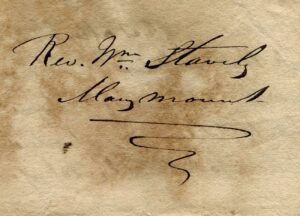 William Stavely (1743–1825), was born near Kells, Co. Antrim, in 1743 and he received his early education at the classical school in Antrim and entered Glasgow University, followed by further theological training in Scotland at the Reformed Presbyterian divinity hall in Paisley.
William Stavely (1743–1825), was born near Kells, Co. Antrim, in 1743 and he received his early education at the classical school in Antrim and entered Glasgow University, followed by further theological training in Scotland at the Reformed Presbyterian divinity hall in Paisley.
He was licensed to preach by the Irish Reformed Presbytery in December 1769, and in 1772, after receiving a call from the covenanters between the ‘bridge of Dromore and Donaghadee, Co. Down’, was ordained at Conlig, near Newtownards. By 1776 he made Knockbracken, Co. Down the centre of his work.
By the close of the eighteenth century he had helped to establish five congregations in the area: Drumillar and Rathfriland, Co. Down, Ballylane, Co. Armagh, and Fairview and Creevagh, Co. Monaghan. These efforts have afforded him the title of ‘the great Irish apostle’ of the Reformed Presbyterian church.
In 1800 he was installed in Kellswater congregation where he remained the rest of his ministry. he died at his home at Marymount, Cullybackey in 1825.
In 1795 he published War proclaimed and victory ensured, or the Lamb’s conquests illustrated (Belfast, 1795), a prophetic pamphlet in which he argued that the French revolution was God’s instrument for toppling the monarchies of Europe. In 1794, under the auspices of the Northern Star, to which he had contributed on several occasions, he added a preface to the reprint of three millenarian tracts which predicted the end of monarchical government in Great Britain and Ireland. A year later he published Appeal to light; or, The tenets of deists examined and disapproved (Belfast, 1796), in which he commented on Thomas Paine’s Age of reason (1794).
(Adapted from the Irish Dictionary of Biography)
These manuscript sermons and other literature mostly date from after 1800 and give an insight into his life and times.
War Declared and Victory Ensured, Published Sermon 1795
A Summary of Causes of a Fast Day
Causes of Thanksgiving, 1 Thessalonians
Second Sermon, Song of Songs 3;11
Notebook containing various sermons
Section of a notbook containing a poem

